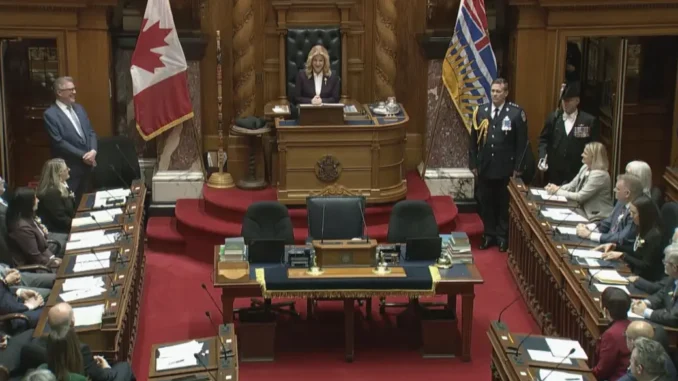
Throne Speech outlines plan to protect BC from US tariffs.
In the face of escalating trade tensions with the United States, British Columbia’s government has unveiled a comprehensive strategy to shield its economy from the potential impacts of proposed U.S. tariffs. The 2025 Throne Speech, delivered against a backdrop of uncertainty, outlines a multifaceted approach aimed at economic resilience, diversification, and assertive countermeasures.
Economic Strengthening and Growth
Central to British Columbia’s plan is the bolstering of its domestic economy. The government emphasizes the importance of investing in local industries to reduce reliance on U.S. markets. This includes support for small and medium-sized enterprises (SMEs) through grants and low-interest loans, fostering innovation, and enhancing competitiveness. By nurturing homegrown businesses, the province aims to create a robust economic foundation capable of withstanding external shocks.
Diversification of Trade Relationships

Recognizing the risks of over-dependence on a single trading partner, British Columbia is actively seeking to diversify its international trade relationships. Efforts are underway to strengthen ties with other Canadian provinces and territories, promoting interprovincial trade as a means to mitigate the impact of U.S. tariffs. Additionally, the province is exploring new markets in Asia, Europe, and Latin America, aiming to establish alternative export destinations for its goods and services. This strategic pivot is designed to open new avenues for economic growth and reduce vulnerability to U.S. policy changes.
Firm and Forceful Response Measures
In anticipation of the U.S. implementing a 25% tariff on Canadian imports, British Columbia has outlined a series of retaliatory measures. Premier David Eby has stated that “everything is on the table,” including the imposition of targeted tariffs and specific embargos on U.S. goods. The province is considering focusing these countermeasures on products from Republican-led states, aiming to exert political pressure by impacting key constituencies. This approach is intended to convey the serious repercussions of the U.S. tariffs and to encourage a reevaluation of such policies.
Collaborative Efforts and Coalition Building
The government is forming a coalition comprising leaders from the business community, labor unions, and First Nations. This coalition will work in concert with the government to develop and implement responsive strategies to the U.S. tariffs. By uniting diverse stakeholders, British Columbia aims to present a cohesive front, ensuring that the interests of all sectors are represented and that the response is both comprehensive and effective.
Federal and Provincial Coordination
British Columbia’s strategy is aligned with federal initiatives, reflecting a unified “Team Canada” approach. The province supports the federal government’s plans to impose retaliatory tariffs on U.S. goods, particularly those originating from regions that have been instrumental in the implementation of the U.S. tariffs. This coordinated effort is designed to maximize the impact of Canada’s response and to demonstrate national solidarity in the face of economic aggression.
Impact on Key Industries
The proposed U.S. tariffs pose significant threats to several of British Columbia’s vital industries, notably forestry and lumber. Premier Eby has described the potential 25% tariff as “devastating” for these sectors, which are integral to the province’s economy. In response, the government is exploring measures to support affected industries, including financial assistance, efforts to open new markets, and initiatives to increase domestic consumption of locally produced goods. These actions aim to cushion the blow to these industries and preserve jobs and economic stability within the province.
Public Sentiment and Nationalism
The trade dispute has ignited a surge of patriotism among Canadians, with movements encouraging the consumption of domestic products over American imports. Campaigns promoting “Buy Canadian” have gained momentum, reflecting a collective resolve to support local businesses and reduce economic dependence on the U.S. This groundswell of national pride serves to bolster the government’s position and provides a societal foundation for the economic strategies being implemented.
Conclusion
British Columbia’s comprehensive plan to counteract the potential impacts of U.S. tariffs is a testament to its commitment to economic resilience and sovereignty. Through strategic investments in local industries, diversification of trade partnerships, assertive retaliatory measures, and collaborative efforts across various sectors, the province is proactively addressing the challenges posed by the current trade environment. This multifaceted approach not only aims to protect British Columbia’s economy but also to reinforce its position as a robust and self-reliant participant in the global marketplace.
Leave a Reply